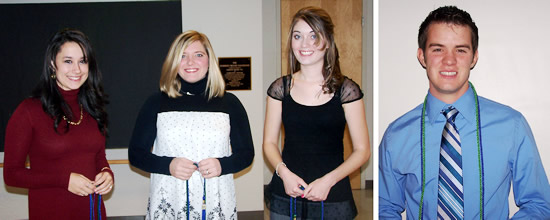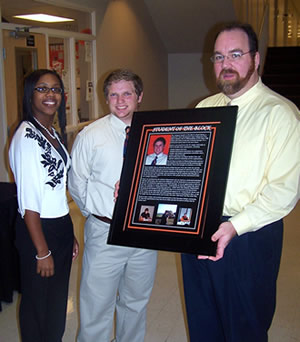Tusculum College students may compete for $4,000 in cash prizes by entering the Curtis ’28 and Billie Owens Literary Prize Contests.
Students may submit their best work in Fiction, Non-fiction, Poetry and/or Scriptwriting. Each category’s prize is $1,000.
The rules are as follows:
- Submit bound entries in a folder
- Attach a cover letter stating
- your name
- local address
- local telephone number
- e-mail address
- the title(s) of your work
- the genre(s) you are entering
- Do not include your name or any other identifying information on any page except the cover page
- Submissions may contain as many stories as you wish, but must total between 10-25 pages
- Submit at least three poems, no longer than a combined 12 pages
- You may submit in as many categories as you wish
Submission deadline: 12:00 noon on February 1, 2008
Submit to Pat Stansberry, 213 Virginia Hall






 Patty Virginia Sarden was honored on Wednesday (Dec. 12) for her service to make the local community a better place to live as she was presented the Greene County Women of Courage Award.
Patty Virginia Sarden was honored on Wednesday (Dec. 12) for her service to make the local community a better place to live as she was presented the Greene County Women of Courage Award. The inaugural Student of the Block is Micah Haney, a sophomore Sport Management major hailing from Fort Payne Alabama. He is a 2006 graduate of Fort Payne High School and wishes to become a General Manager for a professional sports team in the near future.
The inaugural Student of the Block is Micah Haney, a sophomore Sport Management major hailing from Fort Payne Alabama. He is a 2006 graduate of Fort Payne High School and wishes to become a General Manager for a professional sports team in the near future. After serving the last four months in an interim role, Frankie DeBusk has been named the permanent Director of Athletics at Tusculum College announced interim president Dr. Russell Nichols.
After serving the last four months in an interim role, Frankie DeBusk has been named the permanent Director of Athletics at Tusculum College announced interim president Dr. Russell Nichols. that competed for South Atlantic Conference championships in the fall, four finished in the top half of the league standings, including the men’s soccer team that claimed a share of the SAC Championship and advanced to the NCAA Division II Tournament for a third straight time.
that competed for South Atlantic Conference championships in the fall, four finished in the top half of the league standings, including the men’s soccer team that claimed a share of the SAC Championship and advanced to the NCAA Division II Tournament for a third straight time.